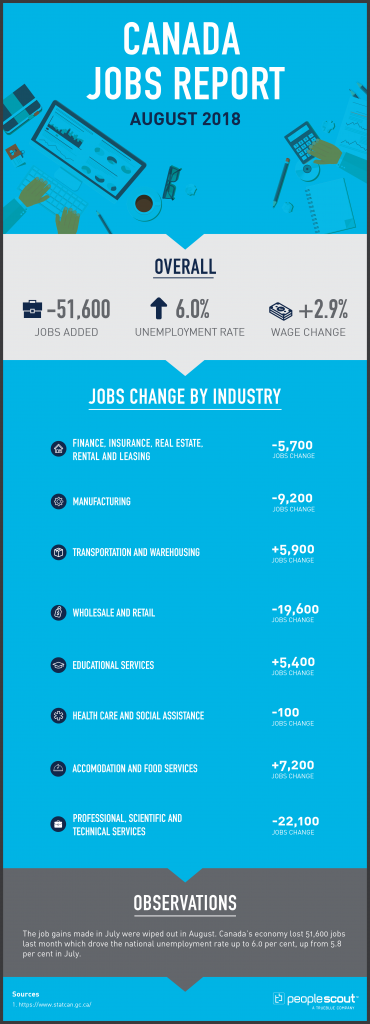
Statistics Canada released its August 2018 Labour Force Survey which shows a loss of 51,600 jobs from the Canadian economy, driving the unemployment rate up to 6.0 per cent from 5.8 per cent in July. The loss of 92,000 part-time positions contributed to the drop.
The Numbers
-51,600: The economy lost 51,600 jobs in July.
6.0%: The unemployment rate rose to 6.0 per cent.
2.9%: Wages increased by 2.9 per cent over the last year.
The Good
Offsetting the loss of part-time jobs, full-time jobs rose by 40,400. For three provinces, the news was more positive than the nation as a whole. Employment in Alberta increased by 16,000, where the unemployment rate remained at 6.7 per cent because more people participated in the labour market.
In Manitoba, employment rose by 2,600, due to an increase in part-time work, and the unemployment rate was 5.8 per cent. While over the last year, employment in the province was unchanged, the unemployment rate increased 0.8 percentage points as the number of people looking for work increased in August. In British Columbia, employment edged up and the unemployment rate increased 0.3 percentage points to 5.3 per cent as more people in the province were brought into the labour market.
Compared to 12 months earlier, Canada’s overall employment is still up 0.9 per cent, following the addition of 171,700 jobs, including 326,100 full-time positions.
The Bad
The job losses in August wiped out the gains made in July. Ontario, Canada’s most populous province, lost 80,100 jobs last month after gaining 60,600 in July, both of which were almost entirely caused by volatile swings in part-time work. Ontario’s August decrease, a drop of 1.1 per cent, was by far the biggest decline among the provinces.
Average hourly wage growth continued its gradual slide in August to 2.9 per cent after increasing 3.2 per cent year over year in July and 3.6 per cent in June. The slowing of wage increases may create difficulties for Canadian employers who could see workers leave for jobs in other companies with the hope of substantial salary increases.
The Unknown
The result of the current intense negotiations between the U.S. and Canada regarding the future of the North American Free Trade Agreement or NAFTA may have a profound effect on the Canadian economy for years to come. Because the United States is Canada’s biggest trading partner, employers in the many sectors that depend on exports for profitability may hesitate to expand their workforce until a final agreement is reached.
![[Webinar] Smart Hiring in the AI Age: What UK Candidates Are Really Doing in 2025](https://www.peoplescout.com/wp-content/uploads/2025/05/AI-enable-applicant-report-320x320.jpg)
